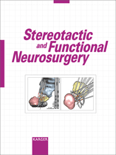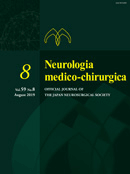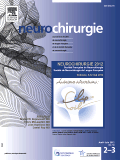
STEREOTACTIC AND FUNCTIONAL NEUROSURGERY
Scope & Guideline
Elevating Standards in Neurosurgical Practice
Introduction
Aims and Scopes
- Deep Brain Stimulation (DBS) Techniques:
The journal extensively covers research on various DBS methodologies, targeting specific brain regions to treat conditions like Parkinson's disease, epilepsy, and obsessive-compulsive disorder. - Radiosurgery Innovations:
Research on stereotactic radiosurgery techniques, including Gamma Knife and focused ultrasound, is a significant focus, exploring their applications in treating brain tumors and movement disorders. - Clinical Outcomes and Patient Safety:
Studies examining the efficacy and safety of neurosurgical interventions, including complications, infection management, and long-term outcomes for patients undergoing these procedures. - Neurophysiological Mechanisms:
Investigations into the neurophysiological changes and mechanisms underlying neuromodulation therapies, enhancing understanding of how these interventions affect brain function. - Ethical and Societal Implications:
The journal addresses the ethical concerns and societal implications associated with advanced neurosurgical interventions, particularly in vulnerable populations and for off-label uses.
Trending and Emerging
- Directional Deep Brain Stimulation:
Research on directional DBS is on the rise, focusing on its advantages in minimizing side effects and optimizing therapeutic outcomes for movement disorders. - Robotics in Neurosurgery:
The integration of robotic systems in stereotactic surgery is increasingly prevalent, with studies exploring their impact on surgical precision and efficiency. - Closed-Loop Systems:
Emerging interest in closed-loop DBS systems that adapt stimulation based on real-time feedback from the brain, promising to enhance treatment personalization and efficacy. - Focused Ultrasound Applications:
The application of focused ultrasound for non-invasive treatment of neurological conditions is trending, with growing research on its effectiveness and safety. - Patient-Centric Research:
There is a growing emphasis on patient-reported outcomes and quality of life assessments post-surgery, reflecting a shift towards more holistic approaches in treatment evaluation.
Declining or Waning
- Traditional Lesioning Techniques:
There appears to be a decline in the number of papers focused solely on traditional lesioning techniques, such as pallidotomy, as newer, less invasive methods gain traction. - Basic Neurosurgical Techniques:
Research centered on basic or foundational neurosurgical techniques has diminished, possibly overshadowed by the rapid advancements in more sophisticated technologies like robotic surgery. - Animal Models in Neurosurgery:
The use of animal models for studying neurosurgical techniques and outcomes is less frequently reported, as the field shifts towards clinical studies and human trials. - Static Imaging Techniques:
There is a noticeable reduction in studies utilizing static imaging modalities for stereotactic planning, with a growing emphasis on dynamic imaging technologies like MRI-guided approaches.
Similar Journals

Journal of Radiotherapy in Practice
Advancing Clinical Excellence in RadiotherapyJournal of Radiotherapy in Practice is a peer-reviewed journal published by Cambridge University Press, focusing on the evolving field of radiotherapy and its application in clinical practice. With ISSN 1460-3969 and E-ISSN 1467-1131, this journal serves as a critical platform for researchers, clinicians, and students in oncology and radiology, providing vital insights into treatment methodologies, patient care, and innovative practices. Although indexed in Q4 quartiles for both Oncology and Radiology, Nuclear Medicine and Imaging, the journal plays an essential role in disseminating clinical findings and advancing the science of radiotherapy since its inception in 1999. Authors are encouraged to contribute their research, case studies, and reviews that align with the journal's objectives, fostering a collaborative environment for sharing knowledge. Despite its current rankings, the journal aims to enhance its impact and visibility in the scientific community, thereby enriching professional practice and patient outcomes in the realm of radiotherapy.

CESKA A SLOVENSKA NEUROLOGIE A NEUROCHIRURGIE
Building a Legacy of Knowledge in Neurology and SurgeryCESKA A SLOVENSKA NEUROLOGIE A NEUROCHIRURGIE is a prominent scientific journal focusing on the fields of neurology and neurosurgery, published by the esteemed Czech Medical Society. Since its inception in 1973, the journal has aimed to disseminate significant research and advancements in clinical neurology and surgery, contributing to the body of knowledge for professionals and researchers in these fields. Operating under a non-open access model, it maintains a dedicated readership interested in valuable insights from the latest studies and clinical practices. The journal is currently classified in the Q4 category in both Neurology (Clinical) and Surgery, reflecting its ongoing efforts to provide a platform for impactful research, despite being ranked in the lower percentiles within Scopus. Based in Prague, Czech Republic, this journal not only serves as a repository of clinical findings but also encourages collaboration and scholarly dialogue among neurologists and neurosurgeons, driving the field towards further innovations in patient care. With coverage extending from 1973 to 2024, it stands as a key resource for those committed to advancing neurological and surgical sciences.

NEUROLOGIA MEDICO-CHIRURGICA
Exploring the Frontiers of Neurological SurgeryNEUROLOGIA MEDICO-CHIRURGICA, published by the JAPAN NEUROSURGICAL SOCIETY, stands as a vital resource in the fields of neurology and surgery, featuring an impressive track record since its inception in 1959. With both an ISSN 0470-8105 and E-ISSN 1349-8029, this journal has embraced an Open Access model since 2000, ensuring that cutting-edge research and clinical advances are readily accessible to a global audience. The journal is currently ranked in the Q2 quartile for Neurology (clinical) and the prestigious Q1 quartile for Surgery as of 2023, highlighting its impact within these disciplines. With Scopus rankings placing it at #145 in Surgery and #206 in Neurology, NEUROLOGIA MEDICO-CHIRURGICA continues to play a crucial role in advancing medical knowledge, making it an indispensable reference for researchers, clinicians, and students alike. The journal's broad scope encompasses both clinical neurology and surgical techniques, positioning it at the forefront of interdisciplinary collaboration in the ever-evolving field of neurosurgery.

Tremor and Other Hyperkinetic Movements
Advancing knowledge on hyperkinetic movements for a healthier tomorrow.Tremor and Other Hyperkinetic Movements is a pioneering open-access journal published by UBIQUITY PRESS LTD, dedicated to advancing the understanding of hyperkinetic movement disorders, including tremors. Since its inception in 2011, the journal has provided a vital platform for researchers, professionals, and students within the fields of neurology and movement disorders to share innovative findings, case studies, and clinical trials. With its contributions spanning from 2012 to 2024, the journal emphasizes high-quality research and fosters collaboration within the medical community. Although it holds a Scopus rank of 156 in the field of Medicine, particularly Cardiology and Cardiovascular Medicine, its value extends beyond metrics, inviting interdisciplinary dialogue about the mechanisms, treatments, and implications of these complex disorders. By offering unrestricted access to its content, Tremor and Other Hyperkinetic Movements ensures that crucial knowledge reaches a global audience, thus enabling advancements in clinical practices and improved patient outcomes.

JOURNAL OF NEUROLOGY NEUROSURGERY AND PSYCHIATRY
Elevating clinical practice through cutting-edge research.JOURNAL OF NEUROLOGY NEUROSURGERY AND PSYCHIATRY, published by the esteemed BMJ PUBLISHING GROUP, is a leading journal that covers pivotal research in the fields of neurology, neurosurgery, and psychiatry. With an impressive impact factor and consistently recognized as a Q1 journal in its respective categories—including Clinical Neurology, Psychiatry and Mental Health, and Surgery—this publication ranks in the top percentiles on Scopus, showcasing its influence in the medical community. Since its inception in 1920, the journal has been committed to delivering high-quality, peer-reviewed content to researchers, clinicians, and students alike, maintaining an exceptional reputation attributed to its rigorous selection process and the depth of its contributions. Access to the journal's articles fosters a comprehensive understanding of progressive research and clinical practices, solidifying its significance for professionals aiming to navigate the complexities of neurological and psychiatric disorders. As a vital resource based in the United Kingdom, the journal continues to propel innovation and knowledge sharing in the ever-evolving landscape of neurohealth.

Brain Stimulation
Exploring the science behind brain stimulation.Brain Stimulation, published by Elsevier Science Inc, stands at the forefront of the interdisciplinary fields of biophysics, neurology, and neuroscience. With an impressive Q1 ranking in its categories and notable Scopus rankings—evidencing its influence in the realm of clinical neurology and general neuroscience—it serves as a critical platform for researchers seeking to disseminate innovative findings related to the applications and mechanisms of brain stimulation techniques. As an esteemed journal with a history of publication since 2008, Brain Stimulation is dedicated to enhancing our understanding of brain function through rigorous scientific inquiry and provides insights that are invaluable for both practitioners and academics alike. This journal exemplifies the importance of advancing research in therapeutic brain interventions, making it a vital resource for anyone involved in the neurological sciences.

Brain Hemorrhages
Unlocking insights into the complexities of brain hemorrhages.Brain Hemorrhages is a pioneering open-access journal published by KEAI PUBLISHING LTD, dedicated to advancing the field of neurology with a specific focus on brain hemorrhages and their clinical implications. Established in 2020, this journal has quickly gained recognition, achieving a 2023 Q3 category ranking in both neurology and clinical neurology, as well as a Q2 ranking in surgery. With an e-ISSN of 2589-238X, it facilitates broad accessibility, allowing researchers and healthcare professionals worldwide to share and access vital findings without barriers. As it converges its publishing efforts toward 2024, Brain Hemorrhages aims to foster interdisciplinary research and clinical insights that can significantly influence treatment outcomes and enhance patient care. The journal stands as a critical resource for those exploring the complexities of brain hemorrhages, making it an essential addition to any academic or professional library within the fields of neurology and surgery.

Neurochirurgie
Bridging Research and Clinical Practice in NeurosurgeryNeurochirurgie, published by MASSON EDITEUR, stands as a prominent peer-reviewed journal in the fields of neurology and surgery, reflecting its commitment to advancing clinical practices and surgical innovations. With an impressive history dating back to 1955 and a convergence period extending to 2024, this journal serves a vital role in disseminating comprehensive research and updates relevant to both medical practitioners and researchers. Neurochirurgie holds a respectable Q3 ranking in clinical neurology and a Q2 ranking in surgery as of 2023, positioning it within the upper echelons of medical journals; its Scopus rankings further underline its growing influence, particularly in the surgical domain. Despite its non-open access model, the journal offers a platform where high-quality, rigorously vetted studies can be accessed, fostering an environment of knowledge exchange that is essential for the ongoing development of neurosurgical practices. For researchers, professionals, and students alike, Neurochirurgie presents an invaluable resource for staying at the forefront of neurological research and surgical advancements.

Turkish Neurosurgery
Fostering Collaboration in Clinical Neurology and SurgeryTurkish Neurosurgery is a distinguished journal published by the TURKISH NEUROSURGICAL SOC, dedicated to advancing the field of neurosurgery and clinical neurology. With an ISSN of 1019-5149 and converging its focus from 1990 to 2024, this regional journal aims to bridge the gap in knowledge dissemination within Turkey and beyond. It holds a notable position in the academic community, categorized in the Q3 quartile for both Neurology (clinical) and Surgery in 2023, illustrating its relevance in these critical fields. Although currently not an open-access publication, it offers insights and research findings that are vital for researchers, practitioners, and students who seek to stay abreast of developments in neurosurgical practices. Located in Ankara, Turkiye, Turkish Neurosurgery provides a platform for sharing rigorous research that enhances clinical outcomes and informs surgical techniques, thus playing a crucial role in elevating the standards of neurosurgery in the region.

RESTORATIVE NEUROLOGY AND NEUROSCIENCE
Exploring Therapeutic Frontiers: Where Neurology Meets NeuroscienceRESTORATIVE NEUROLOGY AND NEUROSCIENCE, published by IOS PRESS, is a premier journal dedicated to advancing the fields of neurology and neuroscience. Since its inception in 1989, this journal has played a crucial role in disseminating cutting-edge research findings and innovative therapeutic approaches that aim to restore neurological function and improve patient outcomes. With a focus on developmental neuroscience and clinical neurology, the journal holds a 2023 Scopus ranking of #129 out of 400 in clinical neurology, and #15 out of 37 in developmental neuroscience, reflecting its significant influence in these domains. Although it operates on a non-open access model, RESTORATIVE NEUROLOGY AND NEUROSCIENCE offers valuable insights for researchers, healthcare professionals, and students seeking to deepen their understanding of neural restoration mechanisms and therapeutic strategies. Located in Amsterdam, Netherlands, the journal continues to foster scholarly dialogue and innovation, contributing to the global advancement of neuroscience and neurology.